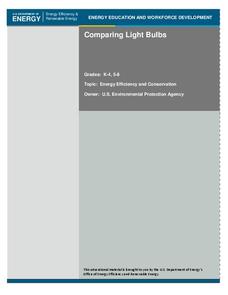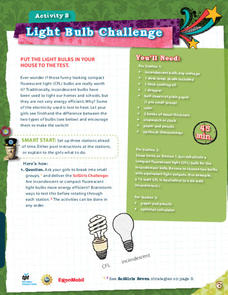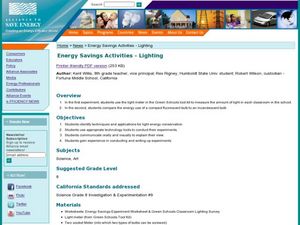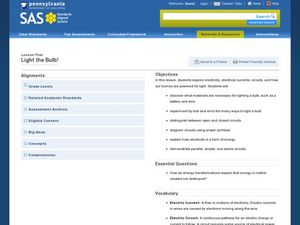Curated OER
Comparing Light Bulbs
Third graders learn how light bulbs are different and which are more cost efficient. In this energy and efficiency lesson, 3rd graders compare the cost of a light bulb and understand that its lifetime is important to their choice.
Curated OER
Comparing Light Bulbs
An average home produces twice as many emissions as an average car. Teach your class how to reduce energy consumption by replacing standard incandescent light bulbs with compact fluorescent light bulbs. Perform an experiment to compare...
PBS
Light Bulb Challenge
Efficiency equals money where homes are concerned. A comparative lesson asks learners to measure heat output of incandescent and compact fluorescent light bulbs. They follow their investigation with calculating the cost of using the two...
Curated OER
Energy Saving activities Lighting
Eighth graders study how light emits energy. In this energy savings activity, 8th graders conduct two experiments to find ways to save energy. In one experiment students measure the light in each classroom and make recommendations for...
Curated OER
Comparing Light Bulbs
Fifth graders compare filaments in different light bulbs. In this science lesson, 5th graders view the filaments of light bulbs under a microscope.
Physics Classroom
Light Intensity
Light intensity varies by the strength of the light bulb as well as the distance to the light bulb. Pupils apply these concepts independently at first. They must solve for the light intensity as either the distance or the wattage of the...
Physics Classroom
Light Bulb Anatomy
Scholars apply their understanding of circuits and electric pathways to many simulations. They move through three different activities and 18 questions, receiving immediate feedback after each answer. The lesson is part of a larger...
Teach Engineering
Light vs. Heat Bulbs
Careful, that light bulb is hot! Compare heat and light energy using a simple light bulb. The exercise addresses energy conservation and presents actual calculations to determine the most cost-effective light bulb.
Curated OER
See the light
How do light and eyesight function? Read a brief passage explaining the phenomena of light and sight. Then have learners draw arrows showing how a boy in a room with a lamp would be able to see a chair. A mini-experiment suggestion is...
Curated OER
Lights Light Up My Life
Middle schoolers conduct an investigation. For this energy conservation lesson, students observe and make predictions about fluorescent and incandescent light bulbs. Working in groups, middle schoolers conduct an investigation to...
Exploratorium
Oil Spot Photometer
Are these two light sources the same? Groups use a white card and a little cooking oil to create a photometer that allows for the comparison of two lights. The Inverse Square Law provides a way to calculate the actual difference in...
Curated OER
Saving on Lighting Energy Activity
In this saving energy worksheet, students compare and contrast the effectiveness of compact fluorescent lighting, incandescent light bulbs, and light emitting diodes.
Curated OER
Light Stick Chemistry
In groups of three with the lights off and the shades drawn, investigators place inactivated light sticks, in three beakers: one filled with ice water, another with lukewarm water, and the other with room temperature water. They wait...
Physics Classroom
Electric Current
Pupils focus on the flow of electricity as they work through three sections of questions as part of a series of lessons on electric circuits. The activities cover the fundamentals, case studies, and law breakers. Learners use conceptual...
National Wildlife Federation
Wherefore Art Thou, Albedo?
In the sixth lesson in a series of 21, scholars use NASA data to graph and interpret albedo seasonally and over the course of multiple years. This allows learners to compare albedo trends to changes in sea ice with connections to the...
Pennsylvania Department of Education
Light the Bulb!
Third graders investigate electrical circuits and how light bulbs are powered. In this electricity and power activity, 3rd graders study the vocabulary necessary which includes the different types of circuits, electrical currents, and...
Curated OER
Circuit Basics
For this circuits worksheet, students compare voltage, current, and resistance. Students draw a battery with a resistor, switch, and light bulb. This worksheet has 6 short answer, 1 matching, and 6 drawing questions.
Teach Engineering
Human Power
How many humans does it take to power a light bulb? The 10th part of a 25-lesson Energy Systems and Solutions unit has learners conduct an experiment to calculate power. They then use the results to determine how many classmates they...
Curated OER
Incandescent Light Bulbs
In this light bulbs worksheet, students read about the creation of incandescent light bulbs and compare them with halogen bulbs. Students complete 3 short answer questions.
Physics Classroom
Know Your Potential
Never underestimate potential—electric or your own. Scholars apply a color scheme based on the changes in electric potential as part of a series on electric circuits. They consider splitting wires, light bulb placement, and voltage as...
Curated OER
Energy Audit
Learners collect data about energy usage and use mathematical calculations to analyze their data. In this energy conservation and statistics math instructional activity, students survey their homes to complete an energy usage worksheet....
Curated OER
The Math of Light
Investigate light intensity, illuminance, and power consumption of different light source.Compare the efficiency of light bulbs then create a persuasive advertisement about it.
It's About Time
The Chemical Behavior of Atoms
Assist your class with this colorful activity as students view and interpret changes in the hydrogen atom. They discuss concepts of the electromagnetic spectrum and use Bohr's model to predict wavelengths and light patterns,...
Institute of Electrical and Electronics Engineers
Series and Parallel Circuits
Learners demonstrate simple circuits and find the differences between parallel and serial circuits. In this electronic lesson plan students work in teams to test different designs using a low voltage light bulb.

























